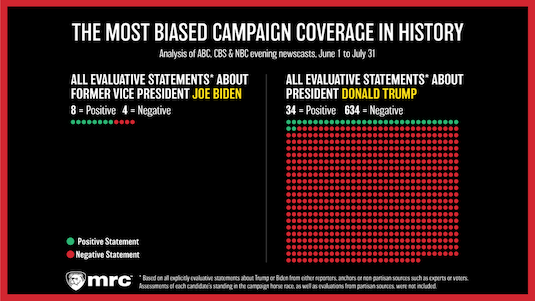The Media Research Center’s Rich Noyes did what he was paid to do in an Aug. 17 post under the blaring headline “STUDY: 150 TIMES More Negative News on Trump than Biden”:
As the pandemic grinds on, the Big Three broadcast evening newscasts are among the highest rated programs on television today — and that means millions of viewers are witnessing the most biased presidential campaign coverage in modern media history.
I’ve been studying the news media and elections for more than 35 years. Trust me — there’s never been anything like it.
A new MRC analysis of all evening news coverage of President Donald Trump and former Vice President Joe Biden in June and July found these networks chose to aim most of their attention and nearly all of their negative coverage on Trump, so Biden escaped any scrutiny of his left-wing policy positions, past job performance or character.
[…]The extra airtime devoted to Trump consisted almost entirely of anchors and reporters criticizing the President. During these two months, our analysts documented 668 evaluative statements about the President, 95 percent of which (634) were negative, vs. a mere five percent (34) that were positive. Using the same methodology (fully described at the end of this article), we found very few evaluative statements about Joe Biden — just a dozen, two-thirds of which (67%) were positive.
Do the math, and viewers heard 150 TIMES more negative comments about Trump than Biden. That’s not news reporting — that’s a negative advertising campaign in action.
As we’ve repeatedly documented, these MRC “studies” are utterly bogus for these reasons:
- It focuses only on a tiny sliver of news — the evening newscasts on the three networks — and suggests it’s indicative of all media.
- It pretends there was never any neutral coverage of Trump. Indeed, the study explicitly rejects neutral coverage — even though that’s arguable the bulk of news coverage — dishonestly counting “only explicitly evaluative statements.”
- It fails to take into account the stories themselves and whether negative coverage is deserved or admit that negative coverage is the most accurate way to cover a given story.
- It fails to provide the raw data or the actual statements it evaluated so its work could be evaluated by others. If the MRC’s work was genuine and rigorous, wouldn’t it be happy to provide the data to back it up?
Given that much of the news coverage Noyes presumably looked at for the study — again, we don’t know for sure because he refuses to post the raw data — involved the coronavirus pandemic and Trump’s questionable handling of it, negative coverage was inevitable, and Noyes is not being paid to admit that Trump deserves any of the negative coverage he’s getting.
Noyes’ attempt to describe the study’s methodology doesn’t help his case:
Methodology: For this report, MRC analysts reviewed every mention of President Trump and former Vice President Biden from June 1 through July 31, including weekends, on ABC’s World News Tonight, the CBS Evening News and NBC Nightly News. To determine the spin of news coverage, our analysts tallied all explicitly evaluative statements about Trump or Biden from either reporters, anchors or non-partisan sources such as experts or voters. Evaluations from partisan sources, as well as neutral statements, were not included.
As we did in 2016, we also separated personal evaluations of each candidate from statements about their prospects in the campaign horse race (i.e., standings in the polls, chances to win, etc.). While such comments can have an effect on voters (creating a bandwagon effect for those seen as winning, or demoralizing the supports of those portrayed as losing), they are not “good press” or “bad press” as understood by media scholars as far back as Michael Robinson’s groundbreaking research on the 1980 presidential campaign.
Noyes is also not going to admit that his determination of whether an evaluative statement is “positive” or “negative” — remember, he’s pretending there are no neutral evaluative statements — is entirely subjective and is not an objective metric. (Declaring a particular media outlet or story to be “biased” is subjective too, but that’s an argument for another day.)
This is not “media research” in any competent academic sense — it’s an attempt to create justification for a political agenda.
